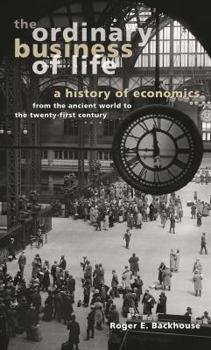The Ordinary Business of Life: A History of Economics from the Ancient World to the Twenty-First Century
Select Format
Select Condition 
Book Overview
In some of Western culture's earliest writings, Hesiod defined the basic economic problem as one of scarce resources, a view still held by most economists. Diocletian tried to save the falling Roman Empire with wage and price fixes--a strategy that has not gone entirely out of style. And just as they did in the late nineteenth century, thinkers trained in physics renovated economic inquiry in the late twentieth century. Taking us from Homer to the frontiers of game theory, this book presents an engrossing history of economics, what Alfred Marshall called "the study of mankind in the ordinary business of life." While some regard economics as a modern invention, Roger Backhouse shows that economic ideas were influential even in antiquity--and that the origins of contemporary economic thought can be traced back to the ancients. He reveals the genesis of what we have come to think of as economic theory and shows the remarkable but seldom explored impact of economics, natural science, and philosophy on one another. Along the way, he introduces the fascinating characters who have thought about money and markets, including theologians, philosophers, politicians, lawyers, and poets as well as economists themselves. We learn how some of history's most influential concepts arose from specific times and places: from the Stoic notion of natural law to the mercantilism that rose with the European nation-state; from postwar development economics to the recent experimental and statistical economics made possible by affluence and powerful computers. Vividly written and unprecedented in its integration of ancient and modern economic history, this book is the best history of economics--and among the finest intellectual histories--to be published since Heilbroner's The Worldly Philosophers . It proves that economics has been anything but "the dismal science."
Format:Hardcover
Language:English
ISBN:0691096260
ISBN13:9780691096261
Release Date:March 2002
Publisher:Princeton University Press
Length:248 Pages
Weight:1.27 lbs.
Dimensions:1.3" x 5.0" x 8.0"
Customer Reviews
3 ratings
A Must Read
Published by Thriftbooks.com User , 14 years ago
"The Ordinary Business of Life" is an absolute must read for anyone and everyone interested in business and how it works, money and how it works, commerce and how it works. It covers the history of commerce as we know it today from virtually the beginning of civilization. I read this when it was first published and I have re-read, and bought new copies ever since. I learn something new every time I open it. I especially recommend this as a gift for anyone newly graduated from high school or entering college. It's knowledge that withstands the ages and will last more than a life time.
A textbook style history of socio-political and economic ideas
Published by Thriftbooks.com User , 15 years ago
The book is not written in any fashion of keeping the readers attention. the reviewer who gave it 3/5 stars citing this reason seems to have a narrow predicate upon how he judges a book. infact that is NOT the purpose of the book, as most wholely informative books. It's nature is to examine the historical cases in which some form of economics was present or affected by someone, from philosophers, politicians, theologians, to historians and economists. If you have interest in the history of economic thought, or WHERE people like keynes got basis of his "inventions" from, then this is where to go. I'm partway through the book and still reading. It's a thick book so don't expect it to have alot of filler-comments by the author with jokes or glorification of topics. On the other hand you will learn
ZZZZZZZZZZZZZZZZZZZ
Published by Thriftbooks.com User , 22 years ago
The good news about The Ordinary Business of Life is that it's a wide-ranging history of economic thought from Ancient Greek thinkers to the rational expectations theorists of the late 20th century. Backhouse doesn't idealize his subjects: he scolds modern economists for formulating abstract mathematical models that have little application to problems in the real world. The bad news is that the book is totally lacking in color or personality. Aiming at comprehensive coverage, Backhouse plods from thinker to thinker and school to school. Giants like Smith or Keynes get only 6 or 7 pages of text; lesser thinkers get only a paragraph or two. The effect is like reading a series of encyclopedia articles.Non-economist readers looking for an introduction to the history of economics would be better off starting with a book like Robert Heilbroner's classic The Worldly Philosophers. That way they'll be inspired to read some more.






